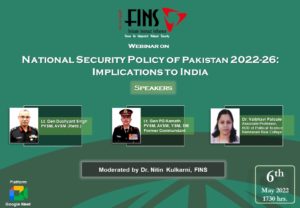Recently Pakistan with whom India has had many conflicts since 1947, released it's National Security Policy 2022-26. It is being brandished by the Pakistan Government as the first such policy document with guidelines for achieving the set national security goals. The policy has been prepared by Pakistan’s National Security Division (NSD) after seven years of diligent and rigorous analysis and consultations with multiple stakeholders including all federal ministries and divisions, provincial governments, governments of Gilgit-Baltistan and Azad Jammu and Kashmir.
Date & Time: May 06, 2022 | 5:30PM IST

Lt. Gen Dushyant Singh (PVSM, AVSM (Retd.))
Lt. Gen Dushyant Singh, PVSM, AVSM (Retd) was commissioned into the ‘NINTH BN OF THE MARATHA LIGHT INFANTRY REGIMENT’ in Dec 81. He is an alumni of NDC, DSSC, CDM, and Naval Post Graduate School California, USA. The General Officer has commanded an Infantry Battalion, Brigade, and a Division in Jammu and Kashmir. He has also held the appointments of IG (Operations), NSG, Chief of Staff of Eastern Command, GOC Corps, and Commandant Army War College. He has been awarded ‘Ati Vishisht Seva Medal’ and ‘Param Vishisht Seva Medal’ for his distinguished services. He is currently Professor Emeritus Defence Studies at Gujarat Raksha Shakti University. He contributes regularly in various defence journals, newspapers and has written chapters in two books “Understanding Suicide Terrorism” and “Countering Terrorism: Psychological Strategies” by Sage Publication.

Lt. Gen PG Kamath (PVSM, AVSM, YSM, SM Former Commandant)
Lt. Gen PG Kamath (Veteran) is a highly distinguished general who has held some of the most coveted appointments in the Indian Army. He is a notable commentator on Defence & National Security issues. An Alumnus of Sainik School, Bijapur and NDA (National Defence Academy) Khadakwasla, the General was commissioned into the Madras Regiment in June 1973. A cerebral scholar warrior, he is a graduate of Defence Services Staff College, Higher Command Course and the prestigious National Defence College. His enviable repertoire of staff appointments includes the prestigious tenure of Defence Advisor to the Indian High Commissioner in Malaysia, the significant position of Additional Military Secretary at the Army Headquarters and Chief of Staff at a Command Headquarter.

Dr. Vaibhavi Palsule (Associate Professor, HOD of Pol. Science, Ramnarain Ruia College)
Dr. Vaibhavi Palsule has teaching experience of 28 years and currently holds the position of Vice-Principal. She has authored two books and many research articles both in English and Marathi. She is associated as a research guide with the Department of Civics and Politics, University of Mumbai, and Naval War College, Goa. Her research interests include international relations and Indian foreign policy.
Webinar Video
A webinar was held on May 6th, 2022 on a Topic “National Security Policy of Pakistan 2022-26:- Implications to India”. The webinar was in the form of Panel Discussion with three eminent persons from the Defence and Academic world, namely Lt. General P.G. Kamath, Lt. General Dushyant Singh and Dr. Vaibhavi Palsule participated as speakers.
Lt. General P.G. Kamath, a distinguished scholar warrior, opened the discussion. He expressed that anything from an adversary shall not be disposed of and we should seriously discuss the Defence policy of Pakistan. He explained that the policy is People Centric that means Pakistan has accepted that the earlier it was military centric. He further added that the Centrality of this policy is Geo-Economic; means to improve Defence and human security, that highlights the focus is still on the Defence sector while human security comes next. The Policy document expresses the need to improve the connectivity with Asia and Africa so as to improve the economic ties, which is not realistic considering its relations with Afghanistan and India who occupy a significant part of Pakistan’s neighbourhood. Pakistan mentions CPEC is a national consensus when in Balochistan there is protest against CPEC. Pakistan also considers itself the leading voice of debt ridden development countries when Pakistan has been bailed out 13th time by the IMF with conditions to increase taxes, paying the external debts and to do currency devaluation. He stressed that there was no paradigm shift in Pakistan’s policy towards India. He explained that one of the weaknesses in this policy is the Indus Water Treaty – IWT which could be revoked if there are no friendly relations between India and Pakistan. India has a good chance to weaponize this water resource. In the end Lt. General Kamath opined that the Policy document is more for the consumption of International Audience and FATF than to focus on the real issues faced by Pakistan.
The Second Speaker in the discussion Dr. Vaibhavi Palsule, a reputed researcher and scholar and currently the Associate Professor, HOD of Political Science, Ramnarain Ruia College, Matunga Mumbai, highlighted the policy document is drafted by an academician after seven long year’s research which is rare in the Pakistan’s tradition of involving the academician and civil society. She explained that the language of the policy is very flowery except for the words used for India with emphasis on the use of popular words which are in the trend and jargon to seek global attention. She stressed that though the policy has a shelf – life is for five years; it may continue in future irrespective of whosoever in the government as Pakistan is vulnerable to political stability. She expressed the main priority of the policy is on the economic revival and reforms - Geo Economic Vision which is supplemental to the Geo-Strategy which is the primary focus and there is no change in Pakistan’s Geo-Political Ambitions. She opined that the economic and fiscal position of Pakistan and its relations with Neighbours are deteriorating so the policy focuses on the geo-economy so it becomes an attractive package for other nations to get involved with it. She highlighted that in this policy Pakistan proclaiming its geographical location is of strategic importance and other nations shall take note of the same. In the end she explained the policy document is giving less importance to India that means Pakistan is proclaiming that it looks beyond India while blending the traditional and non-traditional security issues and claiming the document is to be people centric. Further she added that Pakistan is changing and the policy is for International Security. The overall impression is that Pakistan’s attitude towards India has not changed and Policy is meant more for international consumption.
The Third and Last Speaker Lt. General Dushyant Singh, recipient of PVSM, AVSM expressed that to analyse the policy meaningfully we must examine it from the Pakistani perspective. He opined that the National Security Policy (NSP) of Pakistan states that the centrality of security policy is Geo-Economics. He explained the change in the policy focus from military centric to human centric is due to the international isolation of Pakistan. Barring China and Turkey, all other countries are not giving Pakistan the desired level of support, so it wants to give a message to the world that Pakistan is changing. He expressed that change in Pakistan's policy is also due to deep divide within Pakistani society. He further said that Pakistani economy is in doldrums with rising inflation, diminishing foreign reserves, and mounting external debts. The formulators of the policy believe that if Pakistan can address the economic woes, internal divisive issues of the country will resolve automatically. He further added that this policy is a façade to deceive the international financial institutions and FATF to garner more economic aid to remain economically afloat. The policy aims to get back the support of Organisation of Islamic Countries (OIC) too as in the last few years the level of economic aid from the gulf has fallen drastically. He challenged the re-orientation of Pakistan’s policy stating that if the stated aim of the policy was human centric then the outcome of geo-economic efforts should have gone to ensure sustainable development for upliftment of the human development index instead the policy states that the focus of geoeconomics would be to supplement the geo-political aims and objectives thereby implying that the money generated will go to strengthen the military and the 4% of the GDP would continue to flow into defence budget? To counter this trend India should focus on its military spending so that Pakistan indulges more and more in military spending at the cost of human security which would lead to socio-economic chaos and an implosion. He highlighted added concerns that Pakistan is facing in terms of China raising the issues of security of CPEC, annoyance of the USA over the remarks contained in the policy accusing USA of ignoring Pakistan at the cost of India and concern over the improving relations between Central Asian Republics and India. In the end, Lt. General Dushyant Singh expressed his doubt over the implementation of the Policy by Pakistan in the manner envisaged in the policy given the governance through proxy by the Pakistani Army. The governments in Pakistan function under the constant of threat of Pakistani Army and remain in power till they are in its good books. Pakistani Army in the face of an unstable civilian governance mechanism will continue to drive the security policy with focus on military and geopolitics rather than human security. He also based this conclusion on the fact that the classified part of the policy is not in public domain and the real intent of the policy may lie in that section. Moreover, Pakistani government did not pass the policy from the National Assembly which shows a lack of serious intent to adhere and implement the policy as desired by the Policy Framers.
The online seminar was followed by an exhaustive question and answer sessions with healthy participation from the audience who were present in an online mode. The Programme ended with Shri. Prabhakar Paranjapeji - CEO FINS proposing the vote of thanks.


